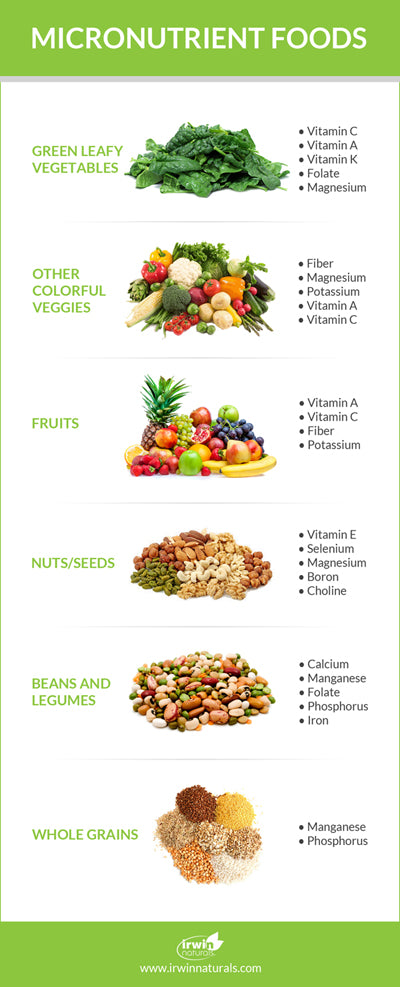Good Nutrition is an important part of leading a healthy lifestyle. March kicks off with International Nutrition Month which focuses on nutrition education and helping people make correct food choices.
Here’s a familiar scenario: you’re in a grocery store and you pick up a box of crackers. You turn the box over to look at the nutrition label. What is the first thing you look at? Calories, grams of carbs, protein and fat per serving right? Well, you’re not alone. We often choose foods based solely on their macronutrient content (carbs, protein, fat) without thinking much about what micronutrients (vitamins and minerals) they provide.
Micronutrients are often less thought about because, like the name –they are just a micro part of our diet as compared to macro-nutrients that make up the bulk of the foods we consume.
We tend to focus on macronutrients because we understand them to be major players in what influences our weight and appearance. However, vitamins and minerals are as critical as the calories we eat, and many would argue—they’re way more important than “calories” when it comes to healthy weight management. Micronutrients play a critical role in the structure and function of our bodies. So, just because they are small, it’s important to realize that they play a BIG part in health maintenance.
Choosing foods solely based on macronutrient content is like selecting a new car to purchase based solely on its tire size and the color of the paint. Obviously, there’s a lot more to the experience of driving a car than tire size and paint color, and likewise, there’s a lot more to foods and how they affect your health than the macronutrient content. Let’s gain some context on some of the more well-known micronutrients and how they affect the health of the body:
For example:
- Calcium mineralizes our bones
- Vitamin C makes our collagen strong, and supports our immune system
- Vitamin K allows blood to clot if we get a cut, and helps direct calcium into the bone matrix
- Vitamin E, an antioxidant, protects healthy cells from being damaged
The list goes on and on. Although micronutrients make up less volume in the foods that compose our diets, this does not mean they’re not important to our health; in fact, quite the opposite. As the saying goes, “there’s no need to throw out the baby with the bathwater.” It is important to consume sufficient micronutrients every day to support a healthy body.
Here’s some ideas on how to get the most micronutrients in your body.
Eat from every food group.
No single food, or food group, is a source of everything. Be sure you’re getting a little of everything. Protein foods, dairy, grains, fruits and veggies should all be part of your diet; that is, if they are well tolerated by your body.
Nutrition is colorful.
Eating a rainbow of colorful fruits and vegetables is an easy way to make sure you’re getting a variety of vitamins, minerals, and antioxidants.
Eat with the Seasons
Consuming the foods that Nature naturally provides with the changing seasons can deliver the best range of micronutrients throughout the year by exposing you to a wide variety of fruits and vegetables. Most often, the produce found in regional grocery stores is shipped in from distant places around the world making it possible for you to eat the same foods year-round—and this is precisely what most individuals do—we’re creatures of habit.
Shopping at local Farmer’s Markets assures that you are eating not only locally grown, fresh and ripe food, but also, that your food choices are restricted to seasonal varieties which forces you to explore, and obtain well-rounded nutrition.
Eat Fresh or Frozen when you can.
Food processing, as well as exposure to light and air, can degrade important vitamins and minerals.
- Processed foods are usually low in nutritional value when it comes to vitamins and minerals, and can be high in saturated fat, sodium, added sugar, calories, and preservatives.
- Don’t let your fruits and vegetables sit for too long before you eat them
- Stock up on frozen produce. Frozen fruits and vegetables are commonly picked at peak freshness and quickly frozen, which preserves their nutrient value.
Take Dietary Supplements.
Some of the special diets that people follow may create additional nutrient gaps that contribute to nutrient deficiencies. If your diet does not contain enough micronutrients, you can develop nutrient deficiencies that can have a negative impact on the health of your body. By taking dietary supplements, you can close those nutrient gaps and provide your body with the essential nutrients it needs, in the quantities that it requires. Fortunately for you, Irwin Naturals has many resources to help fill nutrient gaps, most of which have more than basic nutrients to offer for health maintenance:
Here are some examples:
- Living Green Multis – We carry a Male specific formula and a Female specific formula which cater to the unique nutritional needs for each sex. These formulas include full-spectrum vitamins, minerals, beneficial oils, and targeted blends designed to support the various physiologic systems of the body.*
- Living Greens Super-Food – A serving of this robust nutrient blend gives you a wide range of Superfoods, vegetable and fruit concentrates, as well as dietary enzymes to support digestion.*
- Mega B-Complex – We carry two options for you to access our advanced absorption B-vitamins including Advanced Absorption Mega B-Complex® and a B-Complex combined with a Nitric Oxide Boost (Advanced Absorption Mega-B RED™) for the aging and/or active individual seeking B-vitamins with blood flow support.*
Although these products are specifically designed to fill nutrient gaps for the general population, all of our products provide complementary and targeted nutritional support for their specific health promoting purposes.*
For the month of March, and in celebration of International Nutrition Month, we challenge you to a 30-day healthy nutritional diet which will encourage you to be mindful of the micronutrients in your foods, while also maintaining awareness of the macronutrients. A vitamin and mineral-rich diet is essential for optimal health maintenance. See below a list of micronutrient foods.

|
*These statements have not been evaluated by the Food and Drug Administration. These products are not intended to diagnose, treat, cure or prevent any disease.



